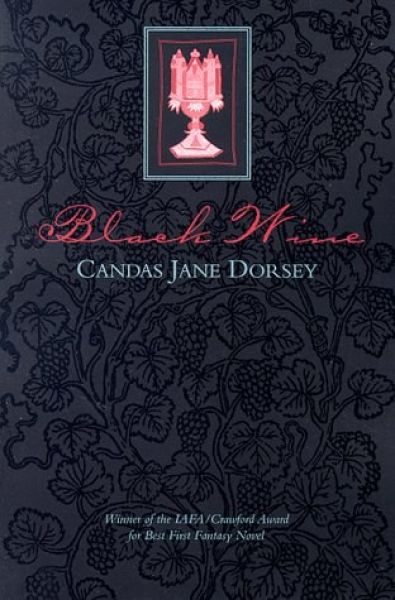Found Family
Black Wine
By Candas Jane Dorsey

15 Nov, 2022
Candas Jane Dorsey’s 1997 novel Black Wine is very hard to categorize. All I can confidently assert is that it is not set in the present. It was Dorsey’s debut novel.
A nameless waif fell from the sky into a predatory society, which enslaved her. Her life is one of hard labour and repeated rape. An encounter with a mysterious madwoman leaves the waif in possession of a book. There are consequences.
The highly non-linear plot also details the adventures of Essa, who lives far from the land where the waif is enslaved. Essa often thinks of her long-lost mother. She never feels at home for long and wanders constantly, seeking her mother or at least information about her mother.
Essa learns that her mother’s face appears on foreign coinage. Inexplicable. Her mother seems to have traveled by airship (with her consent? kidnapped?). The traders who own the airship have suffered as a result. The traders now have a grudge against Essa, just because she is her mother’s daughter.
Having fled a violent police state, Essa seems to have found happiness in a polyamorous trio. Happiness is brief; she cannot stay; she must go back to the road. She takes passage on an airship … which happens to be the same airship that conveyed her mother and whose owners have a grudge.
Over the side with Essa.
What of her quest? And what will become of the waif, traded from one household to another? And just who was that madwoman?
~oOo~
As one might expect from the synopsis above, readers who feel they need content warnings can pass on this novel. The setting isn’t completely nasty, but the terrible bits are very very terrible. There are polities and families that allow, nay celebrate, all the abuses to which humans can subject other humans.
The characters accept this world as normal. They aren’t interested in how it got this way or why it stays this way. They are only interested in unearthing their (tangled, confusing, contradictory) personal histories. There are no helpful clumps of infodump from omniscient narrators. Consequently, it’s impossible to say if this is a secondary-world fantasy with minimal fantastic elements, a futuristic setting with some plot-facilitating psychic powers (or at least people who are very good at kidding themselves that they have them) … or something else entirely.
Many imaginary worlds are curiously tiny; the authors cannot seem to imagine anything above the size and diversity of a mid-sized prairie town. The world Dorsey has imagined is vast. Even airships take a long time to get from A to B. Distance allows linguistic and cultural diversity, which poses problems for wanderers like Essa.
The author seems to have assumed that her readers will tolerate all this confusion. Not only are background and explanation missing, the text cheerfully jumps from character to character without any reason apparent to me.
On the other hand, the prose is engaging. To the extent that one can discern a plot, the plot is intriguing1. I found that I wanted to keep reading, even though confused. Patience was rewarded … eventually.
Black Winewon the 1997 Otherwise (formerly the Tiptree) and the 1998 Aurora, as well as placing third in the 1998 Locus Best First Novel. As far as I can tell, Black Wine is out of print (even the 2013 edition). Used copies seem easy enough to find, but I am baffled that an ambitious, critically successful work like this is out of print. Perhaps it didn’t sell well….
1: I’ve read too many books that were a confused jumble until the end … or even stayed that way right through the end. The narrative in thisbook always made sense on a small scale (the waif arc made sense on its own, the Essa bits made sense on their own). Yet, until close to the end of this novel, the larger context remained obscure. At the end, everything does cohere into something comprehensible.
Books in which the small-scale bits read like noise are much harder to read to the end.
